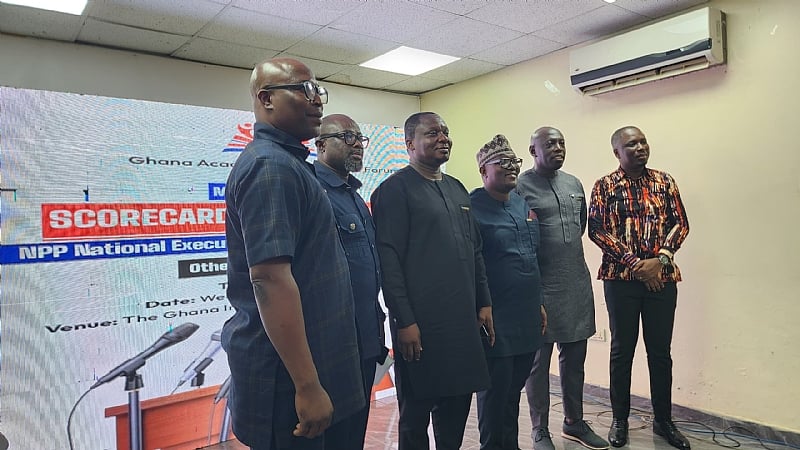The Ghana Academic Professional Forum (GAP-F) has issued its inaugural performance assessment of the New Patriotic Party (NPP) since its transition to the opposition benches, assigning the party a disconcertingly low score of 43 out of 100 after five months. This evaluation paints a stark picture of underperformance, particularly when compared to the National Democratic Congress’s (NDC) tenure in opposition. The assessment, spearheaded by Professor Isaac Boadi of the University of Professional Studies, Accra (UPSA), is intended to promote accountability and provide a compass for political parties operating within Ghana’s democratic framework. The overarching conclusion is that the NPP’s leadership has failed to meet the expectations of an effective opposition, demonstrating a concerning lack of proactivity and efficacy.
GAP-F’s comprehensive evaluation encompassed a range of critical parameters, including the reorganization of party structures, communication strategies and public engagement, the efficacy of parliamentary oversight, the development and articulation of policy alternatives and shadow governance, public mobilization efforts, the formation of strategic alliances, and the party’s financial sustainability. Each parameter was assigned a specific weight, and performance was scored on a 100-point scale, culminating in a weighted average score. The NPP’s performance across these categories reveals a consistent pattern of inadequacy, contributing to the dismal overall score. This detailed methodology underscores the rigor of the assessment and provides a nuanced understanding of the party’s shortcomings.
The NPP’s weighted scores across the various parameters illuminate the specific areas requiring urgent attention. The party scored a mere 6 out of 20 in communication and public engagement, indicating a significant failure to connect with the electorate and effectively articulate its message. Similarly, a score of 3 out of 15 in policy alternatives and shadow governance highlights a deficiency in presenting viable alternative policies and holding the government accountable. While the party fared relatively better in parliamentary oversight, achieving a score of 16 out of 20, its performance in other crucial areas, such as party reorganization, public mobilization, and alliance-building, remained subpar. This uneven performance suggests a need for a more holistic and strategic approach to opposition politics.
Dr. Frank Bannor of GIMPA and the Danquah Institute emphasized the detrimental impact of the NPP’s lack of policy clarity and weak public messaging. He characterized the overall score of 43 as a “red flag,” signifying the party’s failure to position itself as a credible alternative to the incumbent government. Dr. Bannor stressed the urgency of implementing reforms in messaging, policy strategy, and coalition-building to regain public trust and present a viable path forward. His assessment underscores the importance of effective communication and strategic planning in establishing a strong opposition presence.
Despite the largely negative assessment, the report acknowledged the commendable performance of the NPP minority in Parliament in exercising oversight over government actions, particularly in fiscal and governance matters. This relative success highlights the potential within the party and underscores the need to replicate this effectiveness in other areas. The GAP-F report serves not just as a critique but also as a roadmap for improvement, offering specific recommendations to help the NPP reclaim its footing and effectively fulfill its role as a responsible opposition party.
To address the identified shortcomings, GAP-F offered a series of actionable recommendations. The report urged the NPP to develop and publicize comprehensive sector-by-sector policy blueprints to demonstrate its preparedness to govern. It emphasized the importance of activating shadow ministers and engaging in regular public discourse through press conferences and policy dialogues. Furthermore, the report recommended the establishment of a centralized communications war room staffed with trained spokespeople to ensure consistent and coordinated messaging across various platforms. Building strategic alliances with civil society organizations, religious bodies, and labor unions was also highlighted as crucial for expanding the party’s support base. Finally, the report stressed the need for transparency and sustainability in fundraising activities, advocating for the regular publication of fundraising reports and the empowerment of regional finance committees. These recommendations provide a concrete framework for the NPP to rebuild its image and regain public confidence. The GAP-F concluded by reiterating the critical role of a robust and responsive opposition in a thriving democracy and pledged to continue providing periodic assessments to enhance Ghana’s democratic processes. This commitment to ongoing evaluation provides an important mechanism for accountability and continuous improvement within the political landscape. The NPP still has an opportunity to rectify its course, but the window of opportunity is narrowing. The Ghanaian populace deserves an opposition that not only criticizes but also offers clear alternatives and demonstrates effective leadership.


